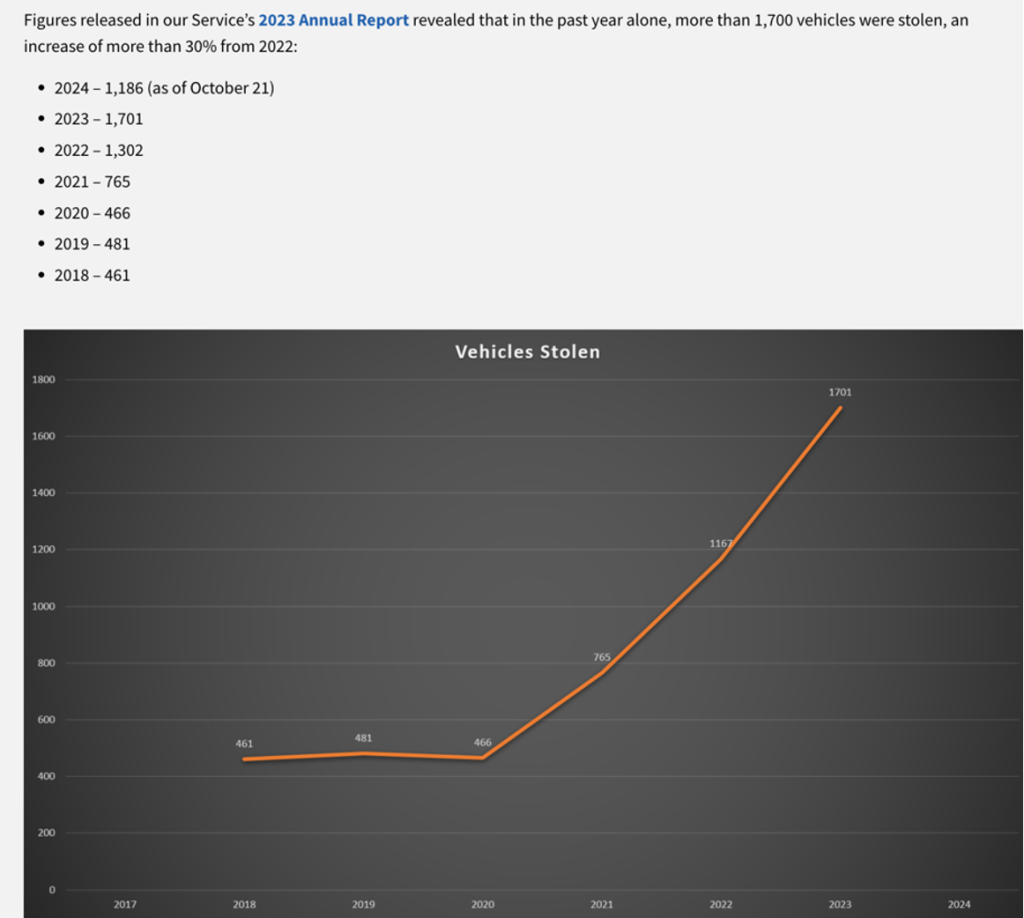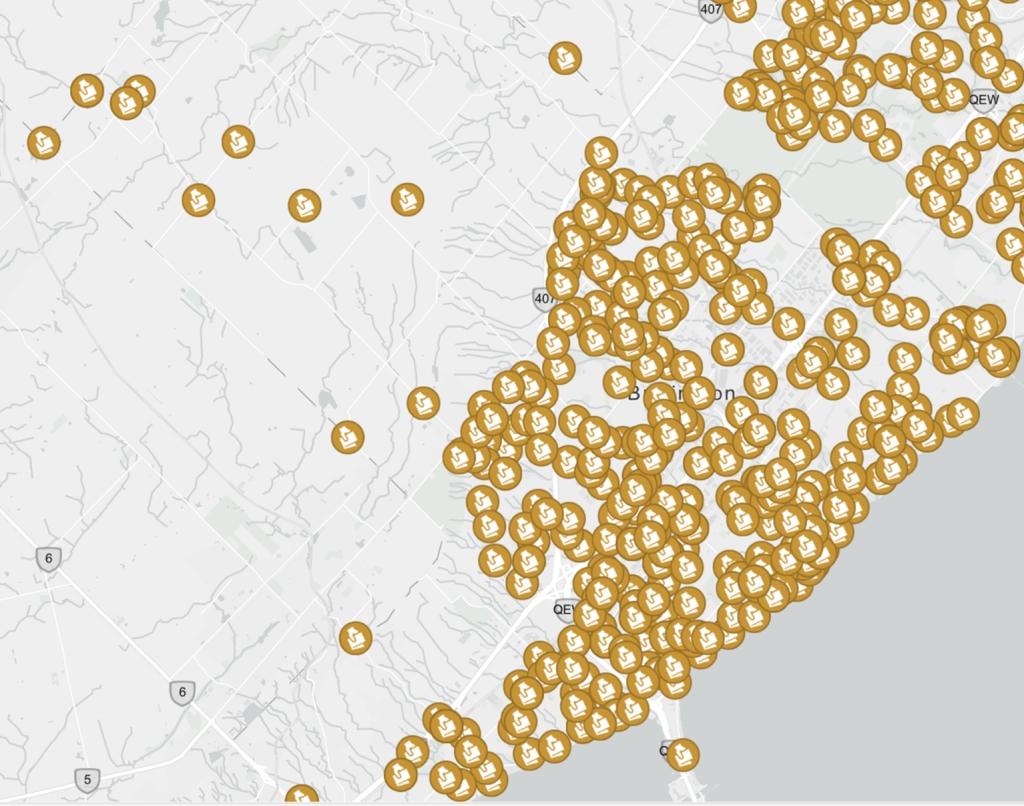Introduction
Another week, and another litany of stories from neighbours and friends who have been negatively impacted by auto theft. In fact, there were three people this week I know whose vehicles were stolen. It must be some kind of record.
Back in June of last year I attended a Crime Prevention meeting hosted by Councillor Stolte for Ward 4 residents concerned about the alarming increase in crime. At the meeting, I heard the usual “song and dance” from Halton Regional Police Services about how to prevent theft. Lock your car, put it in the garage, park in a highly visible location, use a theft deterrent device like a Club, etc., etc.
Despite all of these measures, the problem just keeps getting worse. In an article in Burlington Today recently Police Chief Steve Tanner lamented the fact that once perpetrators are arrested and charged they are released on bail. As lamentable and annoying as that may be, it doesn’t really address the key question many residents have; namely, what are the police and municipal authorities doing to get a grip on this problem?
By the Numbers
Below is a screen shot highlighting the magnitude of the problem, posted on the Halton Regional Police Services website . When I saw these numbers my jaw dropped.

https://www.haltonpolice.ca/en/staying-safe/auto-theft.aspx#By-The-Numbers
When I looked at the website for some concrete information on what the police are actually doing to manage this crisis, I saw words like “Education”, “Response”, “Social Development”, and “Partnerships”. All very nice, but not immediately impactful. Once again, HRPS is putting the onus on residents like you and I to rectify the problem.
One thing Halton Police Services has on its website is an interesting crime map that shows where all the auto thefts are taking place. Here’s the link:
https://experience.arcgis.com/experience/e2d6a32212ba438da4144ea42dfccaf9
If you click on the + button on the map it will show a breakdown by neighbourhood of where the “hot spots” for car thefts are. While there is general dispersal throughout Halton Region when it comes to auto thefts when you look at Burlington two things become apparent. The first is, there that there are a lot of car thefts in Roseland and the Alton communities. The second is that residential neighbourhoods aren’t the only ones experiencing thefts. There are vehicles being poached from parking lots and businesses along Fairview and Mainway too.

How does Halton Region compare provincially? According to the Insurance Bureau of Canada, not particularly well.
In actual dollar costs, Oakville ranked number seventh in 2023 in auto theft claims costs. When one examines the increase in auto theft claims and costs between 2018 and 2023 Milton ranked third, and Oakville ranked fifth. To their credit, IBC acknowledged that the issue is a “national emergency”, and extolled the federal government’s National Action Plan on Combatting Auto Theft.
Time for Some Local Initiatives
When we heard the term “auto theft”, many of us probably thought about a group of kids hot-wiring Uncle Fred’s 2006 Dodge Caravan, taking it for a joy ride, and ditching it in a parking lot a couple of kilometres away. Not anymore. What is going on today is a complex and sophisticated operation by organized criminals to steal high end vehicles, and ship them overseas to countries like Nigeria and Ghana where they command a premium price. These people know exactly the type of vehicles they want, and they are engaging in sophisticated measures to steal them. In some cases, they are resorting to violence to take possession.
The impact that auto theft has on families can be devastating. There is the time taken up by reporting the theft, and the investigation that is involved. Dealing with insurance companies can be laborious and frustrating. Arranging for alternate transportation can be expensive. Then there is the hassle of waiting for a claim to be settled, and then arranging to purchase a new vehicle.
People are now going to extreme lengths to protect their vehicles. One neighbourhood in Toronto recently hired a security firm to patrol their street. I read of one resident who installed retractable bollards on his driveway so that thieves couldn’t steal his high-end sports car. Some are using steering wheel locks, and others are resorting to sophisticated “kill switches” and electronic immobilizers installed on their cars. The price of some of these deterrents can range upwards of $400.
Moreover, this isn’t just an issue about automobile theft. Increasingly, the theft of automobiles is occurring after there has been a home invasion. One such incident occurred in Burlington on November 7th of last year:
The two alleged perpetrators, neither of whom lived in Halton Region, were charged with a list of crimes. Possession of property obtained by crime in excess of $5,000 was, sadly, the least of their suspected offences.
It’s great that we live in a country where individual citizens still can and do take personal responsibility to safeguard their property. However, my question is this: aside from complaining about the criminal bail system in Canada, which is actually a federal responsibility, what exactly are our local police doing?
For instance:
- Are we using drone technology to conduct aerial surveillance of neighbourhoods at night? Real estate agents now use drones to take aerial pictures of homes for clients. The price of drones has decreased in recent years, unlike the budget for HRPS which went up 9.5% in 2024, and is going up another 14.3% in 2025.
- The police use RIDE programs and spot checks around Christmas time to identify intoxicated drivers. Are we deploying this measure across the Region in the morning? People who are out between 1:00 a.m. and 5:00 a.m. aren’t likely going to or leaving for work, taking the kids to soccer practice, or shopping at Costco.
- Are we using decoy vehicles equipped with tracking devices to catch thieves?
- Most newer vehicles operate through a key fob. We know that thieves are gaining access to vehicles by cloning electronic keys to intercept the radio signal using a scanner. The key emits a signal to lock and unlock car doors or start the engine. Electronic key cloning devices save the radio signal in their memories. This level of sophistication presupposes access to certain technologies. Who is selling the scanners and, more importantly, who is buying them?
- It has been reported that individuals working in car dealers are supplying thieves with vehicle identification numbers (i.e. VIN’s). This begs the following questions: 1) who, at car dealerships, has access to this information? 2) what control measures have been instituted to safeguard and protect client information and preserve identities? 3) are people working at automobile dealerships required to undergo criminal reference checks prior to being hired?
- We know that the majority of perpetrators of these crimes live in Toronto, Brampton and Mississauga. These crimes often occur early in the morning. Most of these perpetrators need to travel in vehicles to get to Oakville and Burlington. Are we using scanners to track license plates and determine who, exactly, is entering our communities early in the morning?
Conclusion
Let’s be clear. Auto theft in Halton Region is a crisis. A serious problem warrants a serious response. Lamenting the state of federal legislation on bail reform isn’t going to curb the problem in the short-term. Moreover, those affected by the theft of property don’t need to be “educated” on what to do around auto theft deterrence. Rather, what we need is a comprehensive, drastic and immediate response from the police at the local level. Just because the federal government has launched a joint initiative to combat auto theft nationwide doesn’t preclude local officials from initiating their own measures.
Furthermore, what is Council’s response to all of this? It was great that the Mayor showed up at Councillor Stolte’s meeting to lend moral encouragement, but in truth, what I really want to see are some creative solutions to address the problem, and pressuring HRPS to take more proactive measures. Photo opportunities are nice, but they don’t solve problems, and auto theft in Burlington is a major problem.
Finally, the Halton Regional Police Services tell us they are working hard on this issue. Again, that’s nice, but in truth, everyone works hard. I work hard. My neighbours work hard. My colleagues at BRAG work hard. You, the readers, probably work hard. What I really want to see is the police working effectively. A 70% increase in auto thefts between 2021 and 2022 in Halton, followed by another nearly 31% increase between 2022 and 2023, doesn’t suggest to me that we have this problem under control. In fact, quite the opposite.
I remember that line Councillor Stolte used during her 2018 campaign when she first ran for Councillor. Oh yes: Demand better. I agree. It’s time to demand better!
Enough with the damned excuses! Let’s see some results.

My wife drives a Mercedes, and we live downtown, where the gentrification continues unabated from people fleeing other jurisdictions and bringing with them some costly examples of not only Mercedes but other luxury vehicles, which, luckily for us, increases the choices of the discerning criminal class:
The worry is when my Wife goes shopping, she has to be constantly aware of her surroundings, fortunately for her (but unfortunately for me) she has a very suspicious nature, but I do have to keep enforcing, that it is only a thing, just walk away and let them take it.
There was an article, in one of the Halton papers, that the suburbs are the favourite hunting grounds for criminals, especially if your property backs onto a trail or green space.
My advice; have the keys to your vehicles hanging just inside the front door and remember they will probably be hopped up on crack, and they won’t be that patient while you go hunting for the keys.
Forgot to mention. Something that’s becoming rather popular, is to have a ‘Resto-Mod’ (Restored & Modified) older vehicle or a ‘Sleeper’ an older vehicle that is not what it appears to be in regards to performance; I am still driving my beautiful 12-year-old North American high-end SUV, it’s become rather an enjoyable hobby of sorts, It goes in for regular service and is well maintained, it goes for its annual rust proofing treatment and this summer it was in for body buffing and interior detailing; there is quite a business for upgraded parts for these vehicles, this year, I’m thinking, upgraded Tesla style instrument panel and 360 camera for its park assist and maybe replace the projector headlights with LED while trying to keep it as (OEM) as possible, the upside is that this vehicle is becoming a bit of a collector’s item, because it has a large 5.7L V8 engine, which will last forever. Another plus it is not on any crackhead’s shopping list. P.S. Thanks to this fledgling market, you can even have a complete electric drivetrain installed in any vehicle.